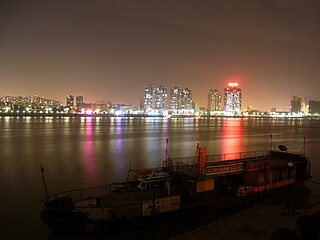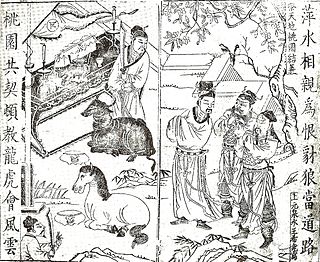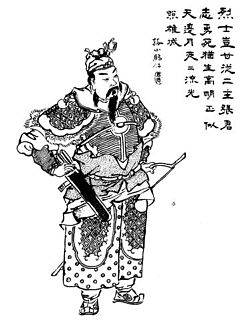
Ma Chao (176–222), courtesy name Mengqi, was a military general and warlord who lived in the late Eastern Han dynasty and early Three Kingdoms period of China. A descendant of the general Ma Yuan, Ma Chao was the eldest son of Ma Teng, a prominent warlord in Liang Province. In 211, he formed a coalition with Han Sui and other northwestern warlords and revolted against the Han central government, which was led by the warlord Cao Cao. The coalition broke up after losing the Battle of Tong Pass against Cao Cao's forces. Ma Chao initially retreated, but later returned to attack and seize control of Liang Province by killing the provincial inspector Wei Kang and forcing Wei Kang's subordinates to submit to him. About a year after Ma Chao started his uprising, Emperor Xian issued an imperial decree ordering the execution of Ma Chao's family members, who were in Ye city at the time. In the meantime, Wei Kang's subordinates, led by Zhao Ang, Yang Fu and others, rebelled against Ma Chao and forced him out of Liang Province. Ma Chao retreated to Hanzhong Commandery, where he borrowed troops from the warlord Zhang Lu, and returned to attack Liang Province but was ultimately defeated and driven back. Ma Chao took shelter under Zhang Lu for a while until around 214, when he heard that the warlord Liu Bei was fighting for control over Yi Province with Yi Province's governor, Liu Zhang. He defected to Liu Bei's side and assisted Liu Bei in capturing Yi Province from Liu Zhang. Ma Chao had served as a general under Liu Bei since then and participated in the Hanzhong Campaign in 219. He died in 222.

The Battle of Xiaoting, also known as the Battle of Yiling and the Battle of Yiling and Xiaoting, was fought between the state of Shu and the vassal kingdom of Wu between the years 221 and 222 in the early Three Kingdoms period of China. The battle is significant because Wu was able to turn the situation from a series of initial losses into a defensive stalemate, before proceeding to win a decisive victory over Shu. The Wu victory halted the Shu invasion and preceded the death of Liu Bei, Shu's founding emperor.

Liao Hua, courtesy name Yuanjian, originally named Liao Chun, was a military general of the state of Shu Han during the Three Kingdoms period of China.

Guan Ping was a military general serving under the warlord Liu Bei during the late Eastern Han dynasty of China.

Pang De, courtesy name Lingming, was a military general who lived during the late Eastern Han dynasty of China. He started his career under the warlord Ma Teng, who was based in Liang Province. In 211, Ma Teng's son Ma Chao, along with a coalition of warlords from Liang Province, started a rebellion against the Han central government, which was controlled by the warlord Cao Cao. After Cao Cao defeated Ma Chao and the coalition at the Battle of Tong Pass, Ma Chao fled to Hanzhong Commandery and took shelter under the warlord Zhang Lu. Pang De accompanied him to Hanzhong. When Ma Chao defected from Zhang Lu's side to another warlord Liu Bei, Pang De remained in Hanzhong and eventually came to serve Cao Cao after Cao Cao defeated Zhang Lu at the Battle of Yangping and took over Hanzhong. In 219, Pang De fought at the Battle of Fancheng under Cao Ren's command against Liu Bei's forces led by Guan Yu. Pang De was captured in battle and eventually executed by Guan Yu when he refused to surrender.

Huang Chengyan was a reclusive scholar who lived during the late Eastern Han dynasty of China. He was from Miannan (沔南), Jing Province, which is around present-day Honghu, Hubei. He was known for being carefree and open-minded.

Guan Xing, courtesy name Anguo, was an official of the state of Shu Han in the Three Kingdoms period of China. He was the second son of Guan Yu and a younger brother of Guan Ping.

Ma Dai was a military general of the state of Shu Han during the Three Kingdoms period of China. He previously served under his uncle Ma Teng, a warlord in northwestern China, during the late Eastern Han dynasty. After Ma Teng's death, he followed his cousin Ma Chao and they joined the warlord Zhang Lu in Hanzhong for a short period of time. Ma Chao later defected to another warlord Liu Bei, and Ma Dai accompanied him. Ma Dai served under Liu Bei and later in the state of Shu Han.

Sima Hui, courtesy name Decao and pseudonym Shuijing, was a hermit who lived during the late Eastern Han dynasty of China.
Zhang Yi, courtesy name Junsi, was an official of the state of Shu Han in the Three Kingdoms period of China.
Chen Shi was a military officer of the state of Shu Han in the Three Kingdoms period of China. He previously served under the warlord Liu Bei in the late Eastern Han dynasty. His name is sometimes recorded as Chen Jie.
Qiao Zhou, courtesy name Yunnan, was an official and scholar of the state of Shu Han during the Three Kingdoms period of China. He previously served under Liu Zhang, the Governor of Yi Province in the late Eastern Han dynasty before becoming a subject of the warlord Liu Bei, who established the Shu Han regime in 221. Qiao Zhou served in the Shu government from the time when Liu Bei ascended the throne to the fall of Shu in 263. He is also known for persuading the Shu emperor Liu Shan to surrender to Wei in 263.
Liu Bei's takeover of Yi Province was a military campaign by the warlord Liu Bei in taking control of Yi Province from the provincial governor, Liu Zhang. The campaign took place between 212 and 214 in the late Eastern Han dynasty. It concluded with victory for Liu Bei and his successful takeover of the province from Liu Zhang. Yi Province would serve as the foundation of the state of Shu Han during the Three Kingdoms period.

The Battle of Jiameng Pass is a fictional battle described in the 14th-century Chinese historical novel Romance of the Three Kingdoms. The battle was fought between the warlords Liu Bei and Zhang Lu in 214 during the prelude to the Three Kingdoms period of China.
Yang Xi, courtesy name Wenran, was an official of the state of Shu Han during the Three Kingdoms period of China. He is best known for writing the Ji Han Fuchen Zan, a collection of praises of notable persons who served in the Shu Han state. Chen Shou, the third-century historian who wrote the Records of the Three Kingdoms (Sanguozhi), extensively quoted and annotated Yang Xi's collection.























